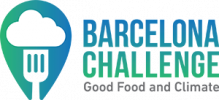Challenges, Categories and Actions
The Barcelona Challenge for Good Food and Climate addresses two key issues: the mitigation of and adaptation to the climate emergency, through a commitment to transform local agri-food systems to ensure access to sufficient, sustainable, healthy and nutritious diets for all, therefore preventing food vulnerability and enhancing food justice.


1. Cities will be able to commit to a specific reduction in their agri-food systems’ GHG emissions. The Barcelona Challenge for Good Food and Climate Toolkit can be used to estimate the projected magnitude of this reduction based on the proposals established in international scientific research. The toolkit also enables the user to estimate other multi-dimensional benefits (socio-ecological benefits and economic returns) of adopting healthy and sustainable diets for all. Cities are encouraged to commit beyond the Nationally Determined Contributions (NDC) which are at the heart of the Paris Agreement.
The Barcelona Challenge aims to overcome these challenges by inspiring and supporting specific action under the six action categories of the Milan Urban Food Policy Pact over the 2021-2030 period. For each category there is a main focus for the actions to be undertaken.
Ensuring an enabling environment for effective action (governance)
The main focus for The Barcelona Challenge in this category is to establish coherent and participative governance mechanisms that allow for the co-production of public policies on climate, food justice, nutrition security and nature, in order to strengthen food systems resilience in the face of extreme climate events, and include food in local Climate Action Plans.
Sustainable diets and nutrition
The main focus is to ensure the transition to sufficient, sustainable, nutritious and culturally appropriate diets for the entire population, in line with the Planetary Health Diet guidelines by increasing overall healthy plant-based food consumption and fully aligning public food procurement with the Planetary Health Diet by 2030.
Social and economic equity
The Barcelona Challenge main focus in this category is to embed the Planetary Health Diet and sustainable (agroecological) food supply approaches within services and programs addressing food vulnerability and poverty with special consideration given to children's and other vulnerable groups' diet.
Food production
The main focus is to promote sustainable, socially fair and equitable forms of production and processing of local, healthy food by ensuring the territorial planning and management of local resources.
Food supply and distribution
The main focus is to re-territorialise and restructure socially and economically viable food distribution and logistics networks (via wholesale, municipal or farmers markets, local food networks, small food retailers and public food procurement services) to adapt them to extreme events and to reduce impact on nature and communities.
Food waste
The main focus is to reduce food loss and waste by 50% by 2030 (from a 2015 baseline), and reuse and recycle food waste and other food-related waste.
Privacy Overview
| Cookie | Duration | Description |
|---|---|---|
| cookielawinfo-checkbox-analytics | 11 months | This cookie is set by GDPR Cookie Consent plugin. The cookie is used to store the user consent for the cookies in the category "Analytics". |
| cookielawinfo-checkbox-functional | 11 months | The cookie is set by GDPR cookie consent to record the user consent for the cookies in the category "Functional". |
| cookielawinfo-checkbox-necessary | 11 months | This cookie is set by GDPR Cookie Consent plugin. The cookies is used to store the user consent for the cookies in the category "Necessary". |
| cookielawinfo-checkbox-others | 11 months | This cookie is set by GDPR Cookie Consent plugin. The cookie is used to store the user consent for the cookies in the category "Other. |
| cookielawinfo-checkbox-performance | 11 months | This cookie is set by GDPR Cookie Consent plugin. The cookie is used to store the user consent for the cookies in the category "Performance". |
| viewed_cookie_policy | 11 months | The cookie is set by the GDPR Cookie Consent plugin and is used to store whether or not user has consented to the use of cookies. It does not store any personal data. |
